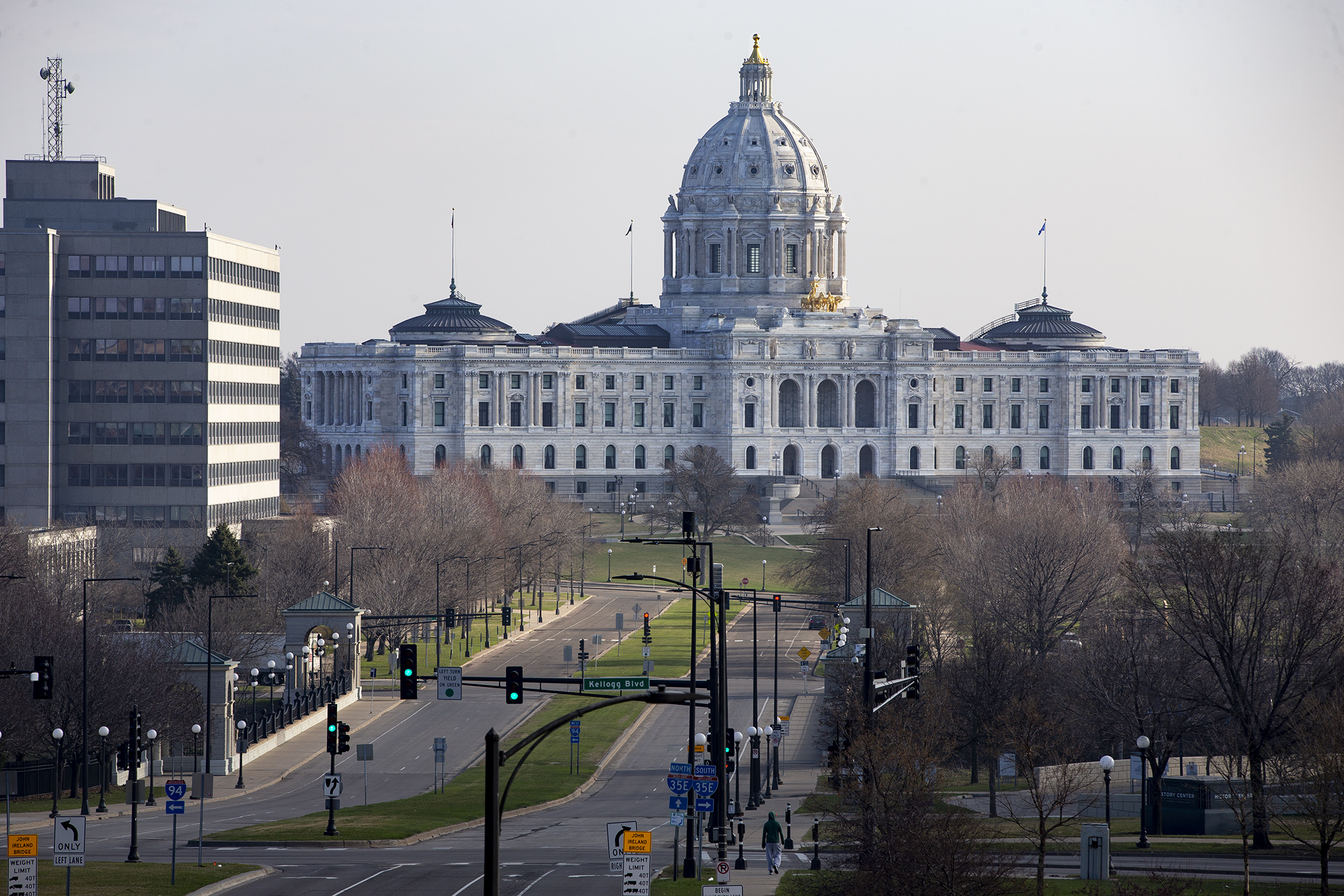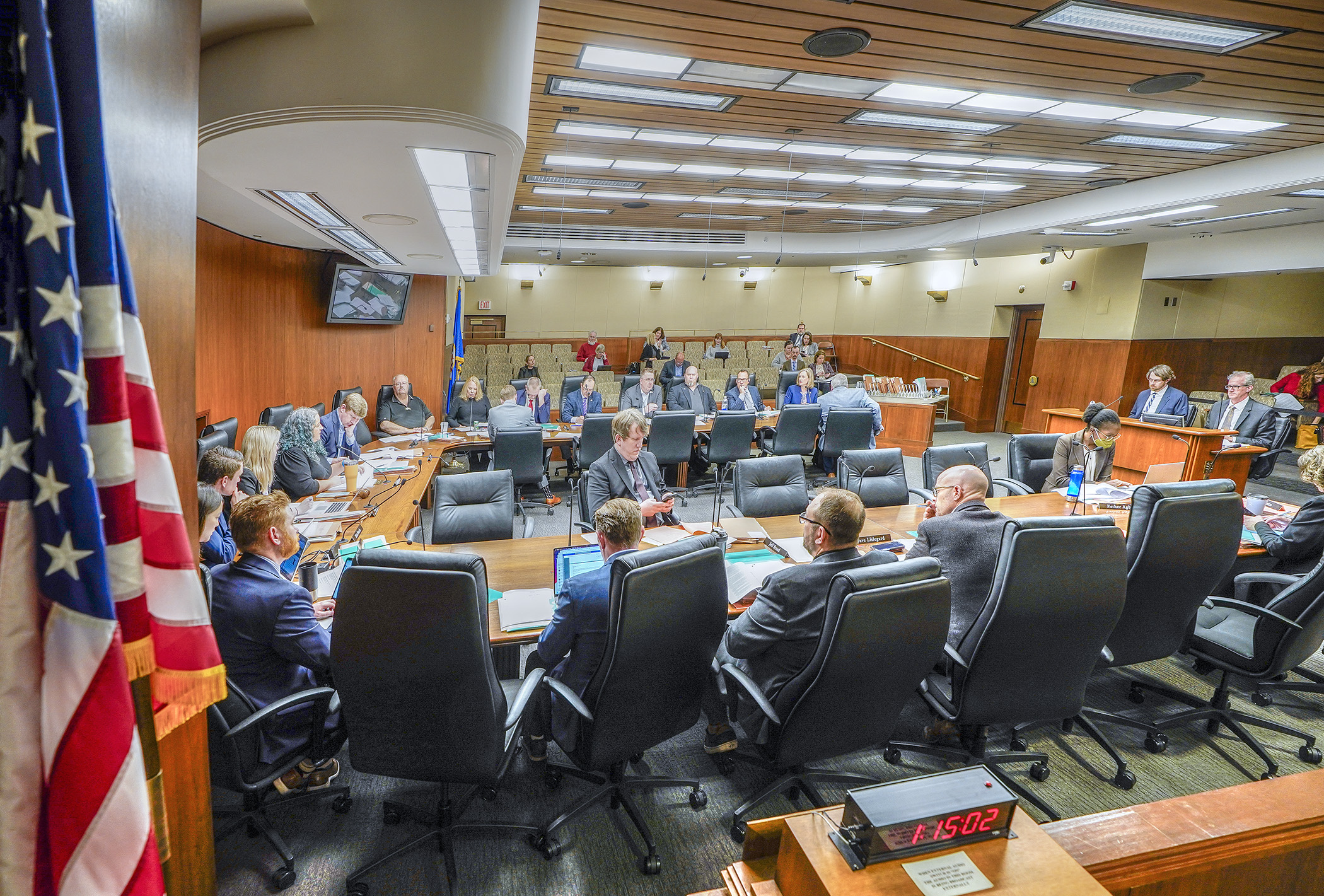Panel takes up 2024 edition of House tax bill

Seeing as Monday was April 15, perhaps the last thing you want to talk about right now is taxes. But getting ready for next year’s filing period is what the 2024 House tax bill is all about: Providing new or expanded tax credits and making that spring ritual simpler and perhaps cheaper.
On Wednesday, the House Taxes Committee got its first look at the bill.
Replaced by a delete-all amendment, HF5247 mostly provides tweaks and enhancements to policies and programs signed into law last year.
The committee plans to hear public testimony Thursday, then entertain amendments and approve it Friday.
Perhaps the most impactful changes for most taxpayers would be adjustments to the child tax credit that became available during this filing season. Two provisions in the bill would establish the ability to receive advance payments on the credit thus making it possible to have staggered payments over the course of a year and allow families with 18-year-olds at home to qualify for the credit (instead of cutting it off at age 17).
And, speaking of advance payments, the bill would create an advance homestead credit for seniors that could ease the cash flow issues in many a Minnesota household.
If you’re among those using such tax preparation software as TurboTax or H&R Block, you may be interested to know that the bill asks the Department of Revenue to establish a direct free file system for individual income tax filers that would help you compute and file your state taxes (although you’d still be on your own with the federal returns). And, if you need help filing, grants would be provided for taxpayer assistance and outreach.
And the bill would make changes to how local sales taxes are administered. The process has previously involved going to the Legislature and asking for permission to put a local option sales tax on the ballot for some particular purpose. But now the task of approving and overseeing such taxes would fall to the state auditor.
Income and Corporate Taxes
Among the changes would be:
- establishing an electronic system for the political contribution refund program;
- excluding debt forgiveness from taxation if the debt was found to be assumed under coercion;
- requiring disclosure of some corporate franchise tax return information;
- requiring a study on corporate franchise tax base erosion;
- opting out of certain federal rules regarding worker classification and withholding; and
- modifying the housing tax credit.
Property Taxes and Local Government Aids
Here are some of the items included in this year’s Property Tax Division report:
- providing property tax exemptions for certain properties owned by Indian tribes;
- increasing the valuation tiers for class 1c homestead resorts;
- modifying requirements for class 4d(2) community land trust property classification;
- allowing abatements for land bank property; and
- modifying local homeless prevention aid.
Minerals Taxes
Several items in the bill would make changes related to minerals taxation and the Iron Range, including:
- increasing maximums for the taconite homestead credit;
- changing the property tax statement for commercial-industrial property;
- modifying the distribution of the taconite production tax;
- changing the name of the Iron Range school consolidation and cooperatively operated school account to the Iron Range school and community development account;
- providing transfers from the Douglas J. Johnson Economic Protection Trust Fund and Taconite Economic Development Fund; and
- authorizing the issuance of bonds by the commissioner of Iron Range Resources & Rehabilitation Department.
Sales, Gross Receipts, and Special Taxes
In this area, the bill’s changes include:
- establishing a gross receipts tax on the operation of amusement devices;
- repealing the tax imposed on illegal cannabis and other controlled substances; and
- providing a sales tax exemption for construction materials purchased by the city of Woodbury.
Tax Increment Financing
 The House Taxes Committee listens to a walk-through of the tax bill by nonpartisan House Fiscal Analysis staff April 17. (Photo by Andrew VonBank)
The House Taxes Committee listens to a walk-through of the tax bill by nonpartisan House Fiscal Analysis staff April 17. (Photo by Andrew VonBank)Existing special tax increment financing laws would be amended for Ramsey, St. Paul and Maple Grove. The bill would also provide new special tax increment financing authority to Brooklyn Center, Brooklyn Park, Eden Prairie, Edina, Minnetonka, Moorhead, Plymouth and St. Cloud.
Public Finance
The bill would modify various provisions relating to local government debt financing, including for school districts, county courthouse projects, economic development authorities, certain residential rental projects, and other projects subject to an annual volume cap.
Other changes
Among the miscellaneous items are:
- providing grants to the Anoka County Soil and Water Conservation District, Browerville Public Schools and the city of South St. Paul;
- increasing the share of the solid waste tax devoted to county waste reduction and recycling programs;
- establishing an aid program for cities to provide financial assistance to homeowners who experienced costs related to emerald ash borer infestations; and
- allowing the creation of land-value tax districts.
The bill would also establish local sales tax equalization distribution payments, provide modifications to the law governing local lodging taxes, and modify the food and beverage and lodging taxes imposed in the city of Minneapolis.
If you’re looking at the state’s balance sheet, here are some of the biggest costs to the General Fund in fiscal year 2025 from the bill’s proposed changes:
- expanding eligibility to 18-year-olds for the child tax credit, $7.8 million;
- direct free file system, $5 million;
- one-time aid increase to counties for homeless prevention aid, $4.4 million;
- one-time dedication to a solid waste management account, $1.8 million;
- aid to cities for emerald ash borer assistance, $1 million; and
- tax credit outreach grants, $1 million.
***
What’s in the bill?
The following are selected bills that have been incorporated in part or in whole into the tax bill:
- HF1171 (Brand)
- HF1342 (Elkins)
- HF3414 (Coulter)
- HF3559 (Cha)
- HF3585 (Bahner)
- HF3604 (Klevorn)
- HF3667 (Norris)
- HF3715 (Agbaje)
- HF3788 (Hansen)
- HF4265 (Norris)
- HF4301 (Gomez)
- HF4302 (Gomez)
- HF4323 (Vang)
- HF4340 (Niska)
- HF4463 (Tabke)
- HF4494 (Wolgamott)
- HF4513 (Greenman)
- HF4535 (Howard)
- HF4550 (Kozlowski)
- HF4572 (Greenman)
- HF4575 (Davids)
- HF4728 (Bahner)
- HF4771 (Acomb)
- HF4823 (Norris)
- HF4826 (Robbins)
- HF4830 (Gomez)
- HF4831 (Gomez)
- HF4915 (Hornstein)
- HF4942 (Youakim)
- HF4973 (Pinto)
- HF4990 (Davids)
- HF5046 (Kotyza-Witthuhn)
- HF5062 (Sencer-Mura)
- HF5075 (Lee, F.)
- HF5164 (Vang)
- HF5177 (Gillman)
- HF5194 (Vang)
- HF5198 (Lislegard)
- HF5213 (Keeler)
- HF5247 (Gomez)
- HF5248 (Gomez)
- HF5266 (Gomez)
- HF5335 (Gomez)
Related Articles
Search Session Daily
Advanced Search OptionsPriority Dailies
Ways and Means Committee OKs proposed $512 million supplemental budget on party-line vote
By Mike Cook Meeting more needs or fiscal irresponsibility is one way to sum up the differences among the two parties on a supplemental spending package a year after a $72 billion state budg...
Meeting more needs or fiscal irresponsibility is one way to sum up the differences among the two parties on a supplemental spending package a year after a $72 billion state budg...
Minnesota’s projected budget surplus balloons to $3.7 billion, but fiscal pressure still looms
By Rob Hubbard Just as Minnesota has experienced a warmer winter than usual, so has the state’s budget outlook warmed over the past few months.
On Thursday, Minnesota Management and Budget...
Just as Minnesota has experienced a warmer winter than usual, so has the state’s budget outlook warmed over the past few months.
On Thursday, Minnesota Management and Budget...